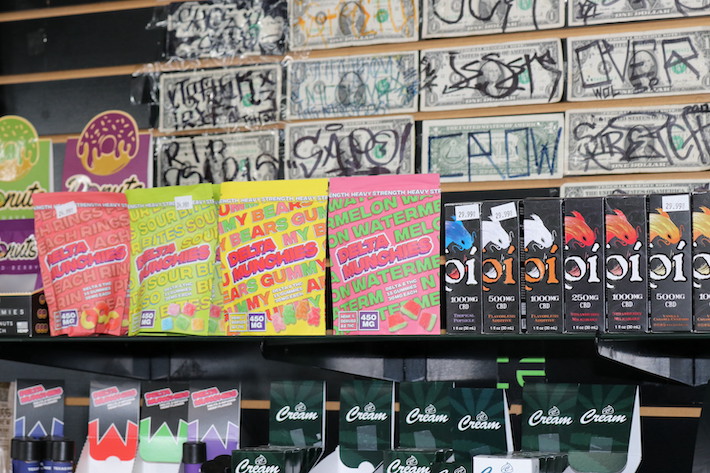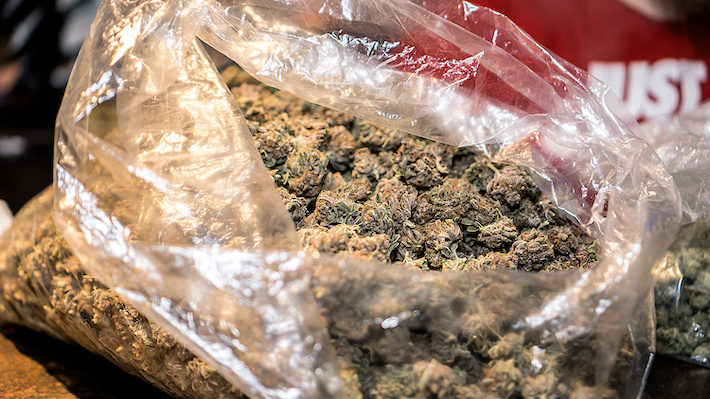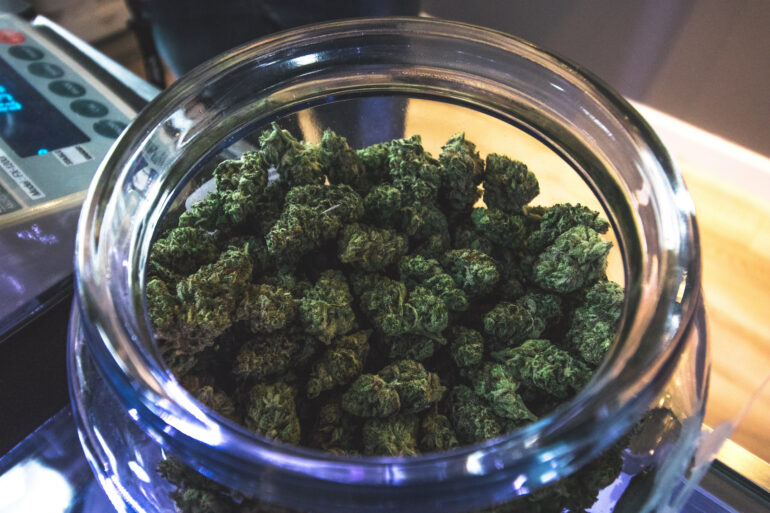Delta-8 THC is legal in Illinois according to written state law. Many stakeholders are confused, though, after the state Department of Agriculture announced a policy forbidding cannabis licensees from using hemp to create intoxicating compounds like delta-8.
While this rule is for the state’s adult use and medical cannabis markets, it still leaves many open questions: is hemp delta-8 THC actually legal in Illinois? Will sellers get in trouble if it’s on their shelves?
We’ve taken an in-depth look at state law to answer the most important questions about delta-8 THC in Illinois.
Is Delta-8 THC Legal to Sell in Illinois?
Delta-8 THC is legal in Illinois under official state law. You can legally use, possess, sell, distribute, market and produce hemp-derived delta-8 products.
Illinois’ Industrial Hemp Act defines hemp as “the plant Cannabis sativa L. and any part of that plant, whether growing or not, with a delta-9 tetrahydrocannabinol concentration of not more than 0.3 percent on a dry weight basis … and includes any intermediate or finished product made or derived from industrial hemp.”
Since delta-8 THC is “any part of that plant,” this seems to include delta-8 as “hemp” by definition.
There is some confusion surrounding a policy document released by the Illinois Department of Agriculture (DoA) on March 3rd, 2022. This limits adult use and medical cannabis licensees from chemically synthesizing delta-8 THC from CBD hemp extract. In the policy, it says:
“Hemp and hemp derivatives may not be used to concentrate or to synthesize intoxicating compounds including but not limited to delta-9 tetrahydrocannabinol, delta-8 tetrahydrocannabinol or THC-O.”
However, this only applies to adult use and medical cannabis licensees. While they can’t use hemp to make delta-8 products for sale in dispensaries, there is no limitation when it is sold as hemp.
RELATED: Delta-8 THC Legality by State
Delta-8 THC Legislation Timeline for Illinois
Illinois legalized delta-8 and all other hemp compounds following Senate Bill 2298 (Illinois Industrial Hemp Act) in 2018, signed by Governor Bruce Rauner.
Before this bill was signed, delta-8 THC was illegal by default. This is because THC was included in the state’s Controlled Substances Act, prior to the legalization of cannabis in 2019 through the Cannabis Regulation and Tax Act. The Controlled Substances Act included isomers of THC, so delta-8 was covered by this prior to legalization.
The Illinois Industrial Hemp Act specifically lifted restrictions on hemp production and established a legal framework for the growth, cultivation, and processing of industrial hemp. It also amended the Noxious Weed Act and the Cannabis Control Act, removing hemp and hemp-derived compounds from the definition of marijuana.
Can Delta-8 THC Be Added to Food?
Delta-8 THC can’t be added to food in Illinois according to federal law and the state’s own hemp act.
The FDA has made it clear that delta-8 THC cannot be added to food, under the Federal Food, Drug and Cosmetic Act, and the Illinois Industrial Hemp Act doesn’t include any provisions to contradict this. In fact, Illinois’ Industrial Hemp Act explicitly states that even if there was a conflict, federal law would win out.
Can You Buy Delta-8 in Illinois?

Delta-8 THC is available to buy in Illinois, through sellers located in the state or online from many vendors across the country.
If you’re stuck knowing which delta-8 brand is legitimate or not, you can find some of our product recommendations here:
We carefully vet companies to help you find safe and reliable products. However, due to potential safety concerns with this compound, we recommend approaching delta-8 with caution.
Delta-8 Alternatives You Can Legally Buy in Illinois
While you can buy marijuana for recreational use in Illinois, it’s also possible to buy hemp delta-9, HHC and other natural, hemp-sourced cannabinoids. THC-O is banned because it is not a natural component of hemp, but naturally-occurring cannabinoids are in the same situation as delta-8.
Are There Age Restrictions on Delta-8 THC Products?
The Industrial Hemp Act doesn’t establish an age limit for delta-8 THC products or any hemp products, but in practice, the age limit of 21 from the Cannabis Regulation and Tax Act is used by stores selling delta-8 THC.
The Industrial Hemp Act paved the way for all manner of hemp products, but it also carved out exemptions for “hemp” when it came to other “cannabis” restrictions. This means that age limits established on marijuana do not apply to hemp, because the definitions of marijuana used specifically say it’s exempt. So if a delta-8 THC product is considered a “hemp” product, then age limits on the sale of “cannabis” simply don’t apply.
Stores do generally place limitations on who can buy, though, so in practice the age limit of 21 for marijuana carries over to delta-8.
Can You Consume Delta-8 THC in Public in Illinois?
You can’t smoke delta-8 THC products anywhere smoking cannabis is banned, and you shouldn’t use delta-8 THC in any public place. However, there is technically no restriction on using hemp anywhere.
Smoking is banned in public places under the Smoke Free Illinois Act, and this law is written in a way that would include delta-8 or anything else you could possibly smoke. This means that you cannot smoke delta-8 THC products in basically any enclosed or partially enclosed public space.
RELATED: How Long Does a Delta-8 High Last?
While the Cannabis Regulation and Tax Act does say that you can’t use cannabis “in any public place,” in the law, hemp is not cannabis, by definition. Technically, then, it should be broadly legal to use delta-8 THC gummies or non-smokeables in public places. However, it’s unlikely that a police officer would be very lenient if you were caught – after all, some state agencies insist that these products are illegal.
Can You Drive Under the Influence of Delta-8 THC in Illinois?

Driving under the influence of delta-8 THC is illegal in Illinois. The state does have a delta-9 THC limit for driving, though, analogous to the blood alcohol concentration limit.
It’s illegal to drive under the influence of marijuana in Illinois (Section 10-35 (a)(5)), and it’s also illegal to drive under the influence of “any intoxicating compound” to the point where you’re incapable of driving safely (Sec. 11-501 (a)(3)). However, state law defines a maximum allowable amount of blood THC, of 5 ng/ml of blood (Sec. 11-501.2. (a)(6)), so it isn’t simply illegal to drive with any THC in your blood, just if you have enough in your system to potentially be impaired.
Drug tests can’t distinguish between delta-8 and delta-9 THC, so if you’re tested for delta-9 THC, your delta-8 use will likely look the same as regular marijuana use. Putting this all together, since the law specifies delta-9 THC as being allowed in low quantities, technically you could get in trouble for having any delta-8 THC in your system. However, in practice it’s unlikely either the officer or the test would be able to tell them apart, so you’ll be tested to see if you exceed the 5 ng/ml limit.
The punishment in the first instance (Sec. 11-501 (c)(1)) is up to one year imprisonment, a maximum fine of $2,500, loss of license for 1 year and a requirement to attend a DUI victim impact panel.
Can You Travel to Illinois With Delta-8?

You can travel to Illinois with delta-8 THC products, but it is wise to bring a certificate of analysis (COA) for the product to confirm what it is.
According to the Transportation Security Administration, hemp products can be taken on flights. With this, since both marijuana and hemp are legal in Illinois, traveling to the state with delta-8 is unlikely to cause issues. It is important to note that the DoA is under the impression that delta-8 THC is not hemp, so it’s possible (though unlikely) that some state law enforcement officers would treat it as “marijuana,” which can’t be moved across state lines.
Closing Thoughts: The Future for Delta-8 in Illinois
There are some proposed changes to the Industrial Hemp Act (starts on page 9), but the only relevant difference for delta-8’s legality is the addition of “including the seeds thereof and all derivatives, extracts, cannabinoids, isomers, acids, salts and salts of isomers” to the definition of hemp. If anything, this makes it easier to argue that the bill legalizes delta-8, since “all… cannabinoids” in hemp are explicitly included.
However, one locality has effectively banned delta-8. In March 2023, Elk Grove Village became the first community to legally prevent “smoke shops” (i.e. non-dispensaries) from selling products containing THC, specifically intended to tackle delta-8. Since dispensaries can’t sell hemp-derived delta-8, this means only marijuana-derived delta-8 could possibly be sold in the village.
It’s likely that other localities will make similar changes to Elk Grove Village, and these could even take root at the state level and restrict delta-8 sales to dispensaries in the future.
